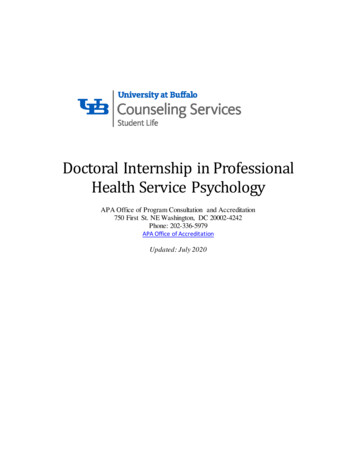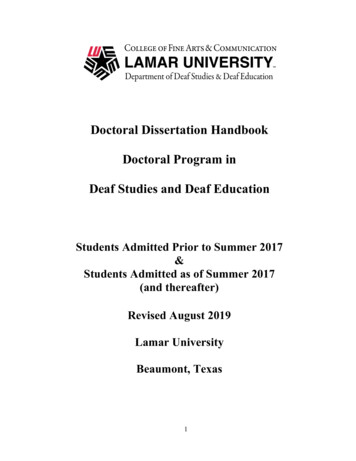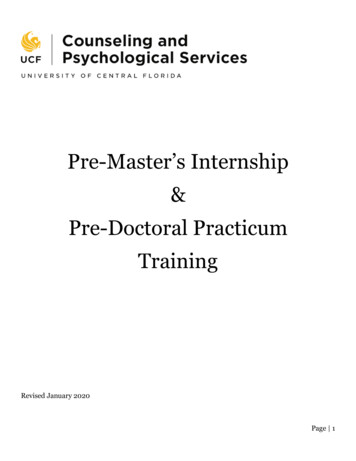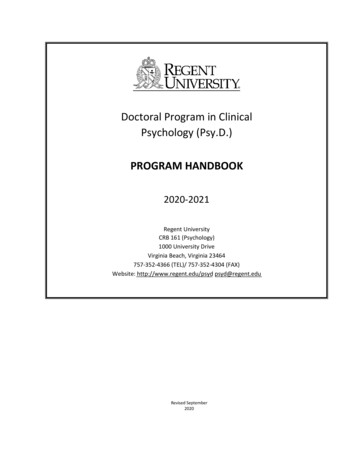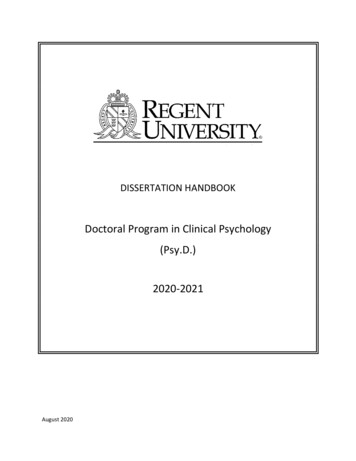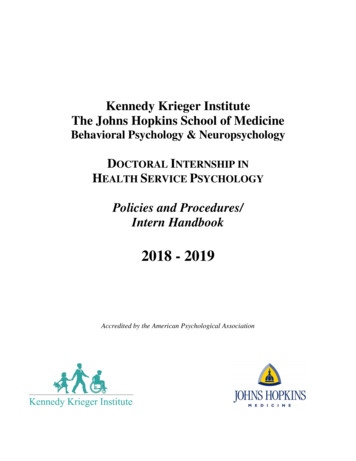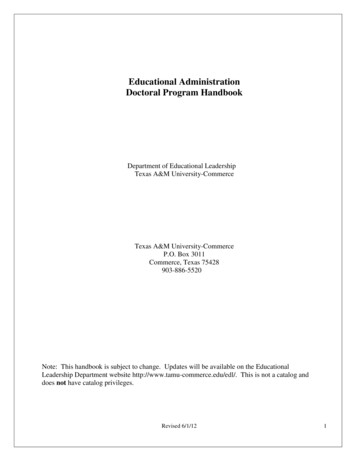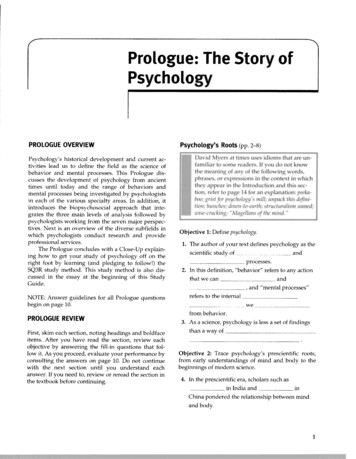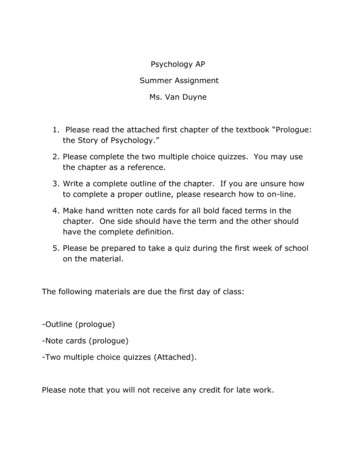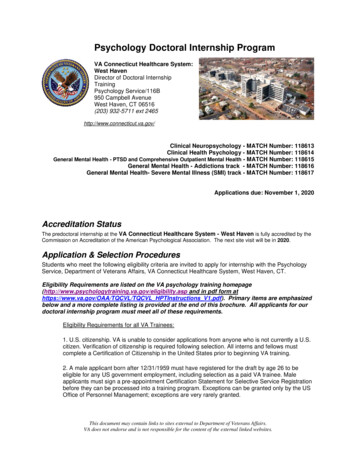
Transcription
Psychology Doctoral Internship ProgramVA Connecticut Healthcare System:West HavenDirector of Doctoral InternshipTrainingPsychology Service/116B950 Campbell AvenueWest Haven, CT 06516(203) 932-5711 ext 2465http://www.connecticut.va.gov/Clinical Neuropsychology - MATCH Number: 118613Clinical Health Psychology - MATCH Number: 118614General Mental Health - PTSD and Comprehensive Outpatient Mental Health - MATCH Number: 118615General Mental Health - Addictions track - MATCH Number: 118616General Mental Health- Severe Mental Illness (SMI) track - MATCH Number: 118617Applications due: November 1, 2020Accreditation StatusThe predoctoral internship at the VA Connecticut Healthcare System - West Haven is fully accredited by theCommission on Accreditation of the American Psychological Association. The next site visit will be in 2020.Application & Selection ProceduresStudents who meet the following eligibility criteria are invited to apply for internship with the PsychologyService, Department of Veterans Affairs, VA Connecticut Healthcare System, West Haven, CT.Eligibility Requirements are listed on the VA psychology training ibility.asp and in pdf form athttps://www.va.gov/OAA/TQCVL/TQCVL HPTInstructions V1.pdf). Primary items are emphasizedbelow and a more complete listing is provided at the end of this brochure. All applicants for ourdoctoral internship program must meet all of these requirements.Eligibility Requirements for all VA Trainees:1. U.S. citizenship. VA is unable to consider applications from anyone who is not currently a U.S.citizen. Verification of citizenship is required following selection. All interns and fellows mustcomplete a Certification of Citizenship in the United States prior to beginning VA training.2. A male applicant born after 12/31/1959 must have registered for the draft by age 26 to beeligible for any US government employment, including selection as a paid VA trainee. Maleapplicants must sign a pre-appointment Certification Statement for Selective Service Registrationbefore they can be processed into a training program. Exceptions can be granted only by the USOffice of Personnel Management; exceptions are very rarely granted.This document may contain links to sites external to Department of Veterans Affairs.VA does not endorse and is not responsible for the content of the external linked websites.
3. Interns and Residents are subject to fingerprinting and background checks. Match result andselection decisions are contingent on passing these screens.4. Doctoral student in good standing at an American Psychological Association (APA) orCanadian Psychological Association (CPA) accredited graduate program in Clinical, Counseling,or Combined psychology or Psychological Clinical Science Accreditation System (PCSAS)accredited program in Clinical Science. Persons with a doctorate in another area of psychologywho meet the APA or CPA criteria for respecialization training in Clinical, Counseling, orCombined Psychology are also eligible.5. Approved for internship status by graduate program training director.6. Again, please see the end of this brochure for a more complete listing of requirements.Application ProcessAfter a careful reading of the information in this document, describing the possible training rotations andmaking sure that you meet and accept our eligibility criteria, please complete the application process ifyou are interested in working with us for your internship year.The application procedure then includes the following steps.1. Complete the APPIC * online AAPI2. In the AAPI Cover Letter, in the following order, with a space between each:a. indicate the track(s) to which you are applying:b. Indicate the virtual interview dates you prefer (12/10/20, 12/17/20, and 1/7/21)c. provide an attestation that you have read and meet all eligibility requirements.3. Three letters of recommendation, as part of the AAPI4. ** All application materials must be submitted through the online AAPI and received byNovember 1, 2020.5. Psychology staff will review all applications and will offer interviews to those who best match withour program and clinical tracks. Preference is given to applicants that have specific training and/or research experiences that are consistent with the type of work that is performed at VACHS.Notification of interview status will be sent by December 2. Once offered a virtual interview, innearly all instances, the interview date you select in the application form will be confirmed. Thevirtual interview day includes a series of presentations in the morning beginning at 8:15 a.m. thatprovide an opportunity to learn more directly about the clinical and research settings and trainingopportunities. At late-morning, applicants spend virtual time with current interns in their area ofinterest prior to the start of virtual individual interviews with staff. We have found that thisprocedure is quite helpful to all concerned in making decisions about training preferences.Position information:1. The stipend for the training year is 30,178. We typically are able to provide stipends for ninestudents, and these are currently distributed in the following manner: General Mental Health PTSD and COMH track (2), General Mental Health - Addictions track (1); General Mental HealthSMI track (1); Clinical Health Psychology (3); Clinical Neuropsychology (2).2. Our anticipated start date is Thursday, July 1, 2021.3. This setting complies with all APPIC guidelines and prepares interns for licensing requirementsin the State of Connecticut. Interns are encouraged to review licensing requirements for thestates in which they ultimately hope to practice so that we can try to meet those additionalexpectations.2
FOR FURTHER INFORMATION WRITE OR CALLJohn Beauvais, Ph.D.Director of Doctoral InternshipTrainingPsychology Service/116BVA Connecticut Healthcare System950 Campbell AvenueWest Haven, CT 06516(203) 932-5711; ext 2465The VA Connecticut Healthcare System, West Haven Campus Doctoral Internship Program is accreditedby the American Psychological Association. For information regarding APA accreditation of this internshipor other accredited internships, please write or call:Office of Program Consultation & AccreditationAmerican Psychological Association750 First Street NEWashington, DC 20002-4242202-336-5979www.apa.org3
Internship Admissions, Support, and Initial Placement DataINTERNSHIP PROGRAM TABLESDate Program Tables are updated: 8/30/2020Internship Program AdmissionsBriefly describe in narrative form important information to assist potential applicants inassessing their likely fit with your program. This description must be consistent with theprogram’s policies on intern selection and practicum and academic preparation requirements:The overall goal of our doctoral internship training program is to prepare the intern with entry-levelcompetencies in Professional Psychology through one of our five emphasis areas (previouslydescribed). Our program emphasizes a scientist-practitioner model of training and encourages thedevelopment of professional and scientific skills consistent with this perspective.Does the program require that applicants have received a minimum number of hours of thefollowing at time of application? If Yes, indicate how many:Total Direct Contact InterventionHoursN Y Amount: NATotal Direct Contact AssessmentHoursN Y Amount: NADescribe any other required minimum criteria used to screen applicants:Psychology staff evaluates all submitted applications and offer interviews to those who best matchwith our program and clinical tracks. Preference is given to applicants that have specific training andresearch experiences that are consistent with the type of work that is performed at VACHS.Financial and Other Benefit Support for Upcoming Training YearAnnual Stipend/Salary for Full-time Interns30,178Annual Stipend/Salary for Half-time InternsNAProgram provides access to medical insurance for intern?YesNoTrainee contribution to cost required?YesNoCoverage of family member(s) available?YesNoCoverage of legally married partner available?YesNoIf access to medical insurance is provided:Coverage of domestic partner available?Hours of Annual Paid Personal Time Off (PTO and/or Vacation)Hours of Annual Paid Sick LeaveYesNo96-104 (4 hours of AnnualLeave earned after everyfull 2-week pay period thatis worked)96-104 (4 hours of AnnualLeave earned after every4
full 2-week pay period thatis worked)In the event of medical conditions and/or family needs that requireextended leave, does the program allow reasonable unpaid leave tointerns/residents in excess of personal time off and sick leave?YesNoOther Benefits (please describe): Interns can opt for supplemental dental and vision benefits inaddition to medical insurance. Interns receive all federal holidays that fall within their appointment(typically 10 each year, consistent with Federal guidelines) and are eligible for up to 10 days ofAuthorized Absence for approved, professional development endeavors.Initial Post-Internship Positions(Provide an Aggregated Tally for the Preceding 3 Cohorts)2017-2019Total # of interns who were in the 3 cohorts27Total # of interns who did not seek employment because theyreturned to their doctoral program/are completing doctoral degree1PDEPCommunity mental health center00Federally qualified health center00Independent primary care facility/clinic00University counseling center00Veterans Affairs medical center110Military health center00Academic health center00Other medical center or hospital140Psychiatric hospital00Academic university/department10Community college or other teaching setting00Independent research institution00Correctional facility00School district/system00Independent practice setting10Not currently employed00Changed to another field00Other00Unknown00Note: “PD” Post-doctoral residency position; “EP” Employed Position. Each individual representedin this table should be counted only one time. For former trainees working in more than one setting,select the setting that represents their primary position.5
Psychology SettingVA Connecticut Healthcare System - West HavenCampus (VACHS) offers healthcare services to adiverse population of Veterans that are provided ina wide range of healthcare delivery settings.VACHS is a Yale University School of Medicineaffiliated education and training institution.VACHS provides primary, secondary, and tertiarycare services in multiple areas (e.g., medicine,geriatrics, neurology, surgery, and mental health)and also provides specialized services for specificclinical problems (e.g., blind rehabilitation,psychosocial rehabilitation for seriously mentallyill, geriatric rehabilitation, women’s health care,psychological and pastoral counseling, alcoholand substance abuse treatment and auditoryrehabilitation). Several programs have been designated as Centers of Excellence (e.g., National Centerfor PTSD and the Mental Illness Research, Education and Clinical Center). Psychology staff are directlyintegrated into many of these clinical settings, but also serve these populations on a consultative basis.Like many other VA settings throughout the nation, our Psychology Service has recently experiencedrapid growth. In addition to expanding our expert clinical staff, VACHS hosts an impressive complementof research psychologists supported through VA and other funding sources. Many of these researchpsychologists serve as clinical and/or research mentors for psychology trainees at VACHS. Thecredentials of psychologists at VACHS are exceptional and diverse. The majority of psychologists atVACHS hold academic appointments at Yale University and regularly contribute to peer-reviewedscholarly publications. The Psychology Doctoral Internship Training Program maintains full APAaccreditation and APPIC membership. Five internship tracks are available to graduate studentsdepending on their interests and level of training. Within General Mental Health there are three tracks:PTSD and Comprehensive Outpatient Mental Health (COMH), Addictions, and Severe Mental Illness(SMI). Additionally there are separate Clinical Health Psychology and Clinical Neuropsychology tracks.At the fellowship level we have multiple post-doctoral training programs that many interns consider whenmaking decisions about their advanced training. In most training years, several students are also offeredtraining at the practicum level, and these opportunities often fall within the Clinical Health Psychology andClinical Neuropsychology rotations.Training Model and Program PhilosophyOur program is most compatible with a scientist-practitioner perspective in all our track programs, thoughscholar-practitioners and clinical scientists, who find that their goals and interests match well with those ofthe training staff, may also be successful candidates. Within this framework, our basic learning model is tohave each intern work with a wide variety of patients under close supervision in an apprenticeship modelwith increasing clinical responsibility over the course of the year. Interns participating in the doctoralinternship training program are offered training experiences that encourage the development ofprofessional and scientific skills/competencies, and the conduct of ethical practice and research. Skilldevelopment is consistent with state-of-the-art scientific inquiry and scholarship within a perspective thatfosters the successful integration of science and practice.Program Goals & ObjectivesThe overall goal of our training program is to prepare the doctoral psychology intern with entry-level skillsin Professional Psychology (e.g.,scientists and teachers with strong clinical backgrounds), with generalist6
skills and competencies that are developed within multiple clinical emphasis areas (i.e., tracks). Ourtraining is tailored to be consistent with the Standards of Accreditation. At the beginning of the trainingyear, students are provided with specific performance criteria for each of their rotations that are reflectedin our evaluation form. These core competencies are fully consistent with the goals and purposes ofpsychologists as identified by the APA and CoA . At year’s end, interns are expected to have met passingcriteria in all competency domains and to be prepared for further specialized training or an entry-levelposition.COVID-19 StatementOur doctoral internship training program has undergone significant changes in response to COVID-19.During the pandemic, we have consistently tried to balance the safety, clinical, and training needs ofVeterans and our doctoral interns. Since March 2020, interns have been permitted to telework andconduct most clinical work virtually as doctoral interns are considered to be essential. Some rotationshave continued to be in person (e.g., inpatient work) with appropriate personal protective equipment.Interns in other rotations are now resuming in-person encounters (e.g., neuropsychological assessment)consistent with the policies being implemented setting-wide. The hybrid mixture of virtual and in-personencounters conducted by our interns will continue to be adjusted in response to how the pandemicevolves in our State and region. Our supervisors will continue to do everything they can to provide thebest training experiences possible. We will consistently explore new technologies, procedures, andflexibilities to support the clinical care and training that is being delivered. We expect that rotations willchange and evolve, and we will work with our interns in guiding that process and meeting their traininggoals. While in person encounters and supervision will remain the preferred method of training anddelivery of care, safety of our interns, Veterans, and staff remains our highest priority, so we expect thattelework and telehealth will continue to be a core component of our hybrid training and practiceexperience.Program StructureOur program structure varies depending on the training track and the interests of the intern. The majorvariations and opportunities are described below in the following order: Clinical Health Psychology,General Mental Health (Three tracks: PTSD/COMH, Addictions, and SMI), and Clinical Neuropsychology.1. Clinical Health Psychology TrackThe Clinical Health Psychology Section’s focus is to develop a broad array of integrative clinical,research, and training programs to address the psychological aspects of physical health and disease.The Section offers integrated and interdisciplinary training experiences in multiple settings within themedical center for various health-related problems including: pain management, weight management,smoking cessation, chronic illness management, and C/L services for inpatients. Interns conduct clinicalwork exclusively within medical settings including Primary Care, the Pain Clinic, and inpatient units.Several of the clinics are interdisciplinary. Activities, driven by cognitive behavioral and biopsychosocialmodels, include: assessment, intervention (individual and group), psychoeducation and health promotionactivities, provider education, and consultation/liaison work. The Section promotes the availability oftimely, goal-oriented, brief, and collaborative services designed to be consistent with a fast paced,academic medical environment and contemporary models of reimbursement for cost-effective clinicalservices. The conduct of clinical research is an important component of the mission of the Section; theCHP section utilizes clinical data in all steps of the treatment process. These elements are thecornerstones to our Clinical Health Psychology Section and its related clinical, research, and trainingactivities.7
Clinical Training Opportunities for Clinical Health Psychology InternsClinical Health Psychology – Primary Care Clinics: The Clinical Health Psychology – Primary CareProgram is a primary focus and setting for trainees in our program. The Primary Care Program, becauseof its structure, provides trainees with the maximal opportunity to interact with the wide array of alliedhealthcare professionals that serve on associated Primary Care Clinics and treatment teams, followingthe interprofessional model. This includes physicians, nurse, medical technicians, social workers,rehabilitation specialists, dieticians, pharmacists, psychiatrists, geriatricians, and case managers.Trainees participate in the evaluation/assessment, treatment planning, and direct care of patients with comorbid medical and psychological/adjustment issues using empirically-based individual and groupinterventions. This emphasis provides the trainee with an opportunity to design, implement, evaluate andfacilitate, within a primary care medical setting, a variety of treatment efforts directed toward theidentification and reduction of health risk related life-style (e.g., tobacco use, obesity, stress management)and coping with illness. Implicit in this approach is the utilization of "stepped care" and the integration ofmedical and mental health services, consistent with the spirit of recent Agency for Healthcare PolicyResearch guidelines. The task of the trainee will be to facilitate the development of more effective andefficient care programs that take advantage of the interprofessional nature of primary care and the widerange of healthcare providers involved in the care of the veteran.Interdisciplinary Pain Management: This emphasis takes place within an interprofessional clinical,research and training program committed to the evaluation of the interaction of the physical,psychological, and sociological aspects of chronic pain problems and the development of mind and bodyintegrated approaches to pain management. Evaluation, treatment planning, active intervention, andcase management occur in outpatient settings. Opportunities for inpatient consultation also exist. Rolesof the resident will include that of primary clinician and pr
VACHS is a Yale University School of Medicine affiliated education and training institution. VACHS provides primary, secondary, and tertiary care services in multiple areas (e.g., medicine, . Additionally there are separate Clinical Health Psychology
